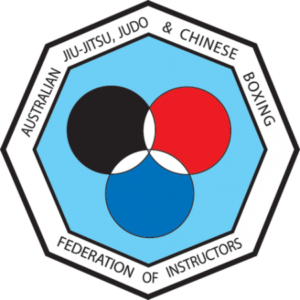Martial Arts of the Federation: Tai-jitsu Ryu JiuJitsu
What will I learn in JiuJitsu?
- Application of Judo (safe falling, throwing, and ground grappling) to self-defence
- Restraint & Control: Standing grappling and arresting techniques
- Escapes from grabs and holds
- Striking techniques and stances
- Self-defence against common unarmed and armed attacks
- Reflexive self-defence
JiuJitsu training methods
Extending the Judo training methods of ukemi, kata, and randori in JiuJitsu we practice direct trained responses to common and realistic attacks.
Beginning with less threatening attacks such as wrist grabs, arm grabs, grabs to clothing, JiuJiitsu students develop confidence before moving on to defences against punches, chokes, headlocks, etc. In JiuJitsu students apply the throwing and ground grappling techniques of Judo to these self-defence scenarios, and add standing grappling, striking techniques (atemi), and restraint and control (arresting) techniques.
JiuJitsu students practice reflexive self-defence in order to respond rather than freeze in the event of a surprise attack.
Why Learn JiuJitsu?
JiuJitsu is an excellent martial art for self defence and develops good all-round fitness. It is a vehicle for self improvement and it’s fun.
Compared to Kung Fu, which focuses more on fist-and-foot techniques, JiuJitsu emphasises grappling and close-quarter self-defence.
JiuJitsu is well-suited to women's and men's self-defence. The term JiuJitsu literally means ‘gentle art’. JiuJitsu emphasizes the efficient use of one’s body. Good technique rather than strength is used to make effective self defence.
JiuJitsu is an ideal martial art to begin learning as a teenager or young adult, and may be practiced to an advanced age.
What is Tai-jitsu Ryu JiuJItsu?
JiuJitsu was the unarmed fighting art of the Japanese Samurai — the Bushi or warrior class. If a Samurai lost or broke his sword in battle, he resorted to the striking and grappling techniques of JiuJitsu to defeat his enemy.
The style of our Federation is called Tai-jitsu Ryu. According to oral tradition, Tai-jitsu Ryu was codified by a group of Chinese Buddhist nuns living in Japan in the 16th Century. It is a very comprehensive style, encompassing many techniques. It includes punches, kicks, throws, strangles, joint locks, use of pressure points and ground-fighting. The emphasis is on the close range. This makes it an excellent martial art for developing self-defence skills.
Find a Martial Arts school near you...
Bayswater
Class held
Tuesday
7:15 pm – 8:45 pm JiuJitsu & Judo
8:45 pm – 9:45 pm JiuJitsu & Judo 6th Kyu +
Box Hill South
Classes held
Monday: 7:30 pm – 9 pm JiuJitsu & Judo
Wednesday: 6 pm – 7 pm Junior JiuJitsu & Judo
Wednesday: 7 pm – 8 pm Kung Fu
Wednesday: 8 pm – 9:30 pm JiuJitsu & Judo
Saturday: 11 am – 12:30 pm Junior JiuJitsu & Judo
Saturday: 2 pm– 3:30 pm JiuJitsu & Judo
Caulfield
Monash University (Caulfield)
Class held
Wednesday: 7:30 – 9:15 pm
Monash Sport Caulfield -
Group Fitness Studio
JiuJitsu & Judo
Clayton
Monash University (Clayton)
Classes held
Monday: 6:45 pm – 8:30 pm
Monash Sport Clayton -
Multi-Purpose Room
JiuJitsu & Judo
Viewbank
Class held
Sunday: 2 pm – 4 pm
JiuJitsu & Judo 13y/old to Adult
Sunday: 4 pm – 5 pm
Junior JiuJitsu & Judo
8-12 year old
Viewbank Primary
Class held
Friday: 1 pm – 1:50 pm JiuJitsu & Judo
for Viewbank Primary Students Only
